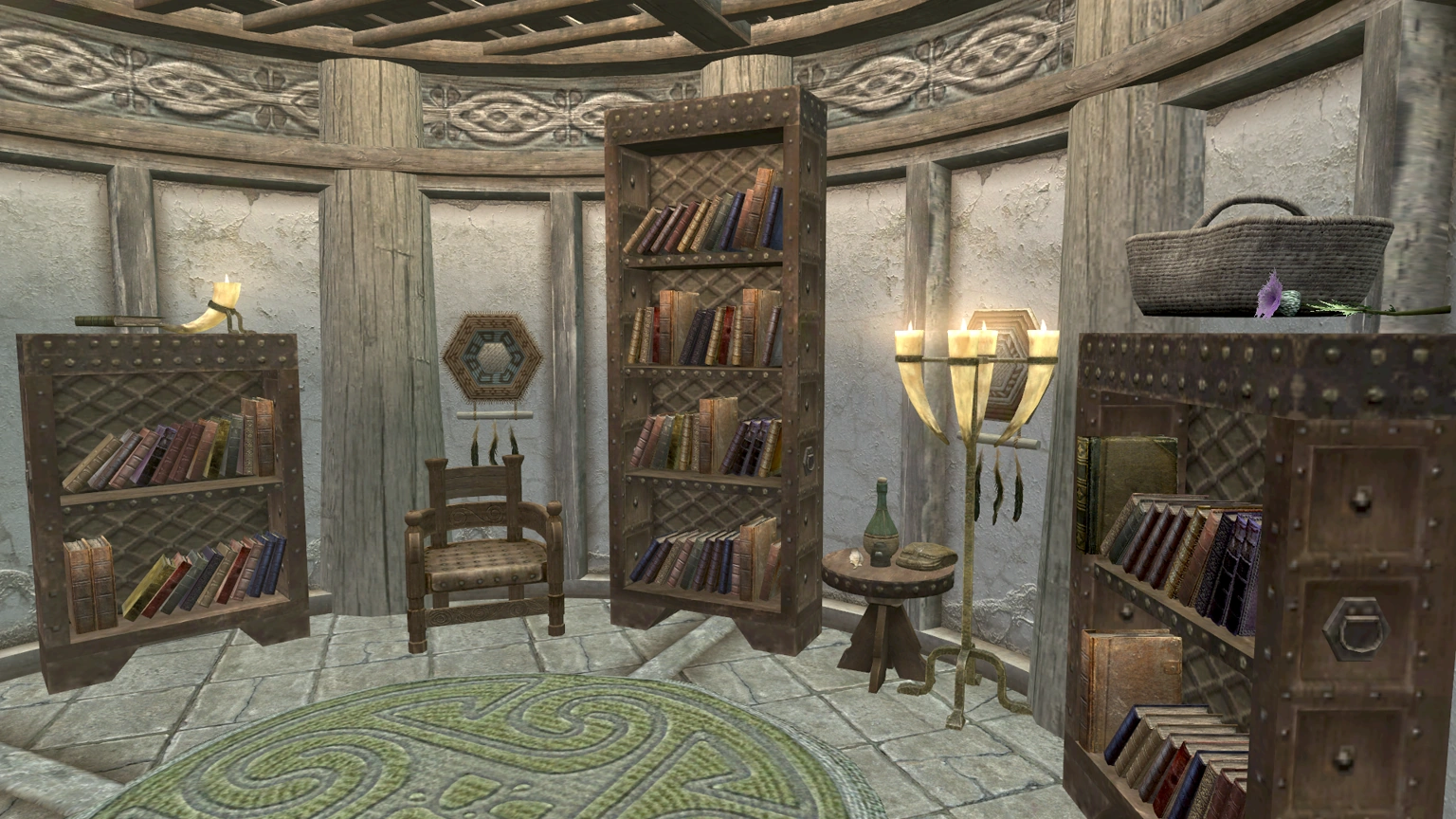SymbolicFrank
Magister
- Joined
- Mar 24, 2010
- Messages
- 1,668
I think the main problem is that people today expect everyone to have GPS and internet. Yes, even their swords & sorcery avatar.
A simple improvement that would require no extra work at all would be to replace the compass marker with map markers, which usually already exist in the game anyway. That alone would make the player pay a lot more attention to hs surroundings instead of just staring at the magic compass. Don't make the markers omniscient either, just have them roughly point to the right village or cave and let the player figure out the rest. It's ridiculous when you're supposed to find an item in some huge dungeon, and there's a giant arrow pointing straight at it the whole time.Quest compass and marker, when they are introduced, should be optional, so that you would be able to turn them off and enjoy a more oldschool feel.
Unfortunately,that would require more work from the devs.
Just give me a blank fucking map with some key locations written down like a real world map and let me annotate and add markers to it as I wish.




Yeah I think the advancement of graphics (more realistic at least) in modern games ruin loads of aspects, people are unwilling to accept quick "janky" animations and instead expect slow "realistic" animations which is why I feel every game is slow as fuck but that's another point haha.Surprised no one here sees the real problem.
Around the time of Oblivion (and even Morrowind had it) the technology had reached the point where fidelity of details come dangerously close to the reality. You can look at the table and see dozen of items there. You can look at a landscape and not see cave or building among forests and hills. It's fine when there's something secret, like a key dropped under the table for a chest you can lockpick anyway. But you can't leave anything important just lying there among other stuff because it would create an experience as interesting as looking for your car keys. Different devs coup with this in different way:
1) Just not use detailed objects. Put everything important on a pedestal or in a highlighted chest. Risen and Kingdoms of Amalur do it this way: you rarely find stuff just lying in the world. It is similar to how adventure games (Tomb Raider) have a special texture for cliffs you can arbitrarily climb making the world look copy-pasted.
2) Use some highlighting. You can rarely see it in RPG - maybe as this top down RPG highlight items button. Dead Space had it: there's a lot of objects in the game but important ones have a small hologram appearing beside them.
3) Use your witcher senses. Or Batman Detective mod. Or Dark Vision. Or whatever Deus Ex Human Revolution thing is called. It helps but it still requires you to lower fidelity of details: you can throw a dozen items at a table, it would be inconvinient to look at them with the special vision.
So as you may see all those solutions have a common problem: they force you to adjust the map. If you take a screenshot of the games I've listed where the character has to interact with something it would be very obvious that this is a game. If you take a screenshot of Skyrim or Fallout 4 you'll see a place first and game arena second. This what the guiding arrow gives developers: a power of being sure that you will still find a quest item after its holder was thrown 50 meters away after you had blown him up. Knowing that you would understand that this small trapdoor is a door without a giant sign near it. You may snobbishly say you don't need those crutches but you do, and no amount of NPC descriptions will help you. It's only partly a cop out by devs solving the problem of bad level design; it's still mostly one of the solutions for inevitable problem.


What? You want to say that Oblivion and newer games has items/world etc so detailed that it's harder to find cave/key on table than in ,let's say, Morrowind (which was perfectly easy to play and only idiots had a problem with finding dwemer puzzle box) or Gothic?





As you said though, this could be solved with actual level design and not just throwing the MC into a massive open world that consists of useless shit and so we wouldn't miss key items or whatever.
You had to do that in Morrowind in the library in the Vivec temple...Now imagine you design a quest where player has to find a specific book. Let's imagine you even tell the character how to get to a building with the book. What then? The house contains dozens of books. Would you place it in some obvious place in a middle of a table under the ray of light? Would you leave a note from an owner explaining where exactly did he leave the book? Well then the note has to be placed somewhere obvious. Will you add a shining aura to that book or a golden cover? Or do you want your character to look through the whole building, seeing several tables like that, looking at each and making sure he checks all the books, and then looks at all the cases?
Quest compass and marker, when they are introduced, should be optional, so that you would be able to turn them off and enjoy a more oldschool feel.
Unfortunately,that would require more work from the devs. The NPCs would have to actually tell us where to go, how to find important locations (like they used to do in Morrowind or Gothic). Travel directions would have to be recorded, voiced etc. Without it turning off the quest compass would make the game quite unplayable - or you would have to rely on bumping by accident on the proper locations.
What really irritates me is not even quest compass but GPS that leads you to your next quest by picking the easiest route. It really infuriated me in Witcher 3. I want to choose my own path!


You had to do that in Morrowind in the library in the Vivec temple...


This is a huge sparkling golden thing. It's still relatively easy to miss for lots of players. Few people ever complete this quest.
What the fuck? Of course NPC descriptions will help you.You may snobbishly say you don't need those crutches but you do, and no amount of NPC descriptions will help you.
The problem here isn't that these are hard to find, but the player's sense of entitlement in expecting to finish every quest. Unusual Gems is a rare collectible quest that most players are not expected to complete. There will be a few that do, and they will feel special when they do because they are special. This "everybody gets 100% achievements" nonsense is the gaming equivalent of "participation trophies". Only it's not just a participation trophy, but the expectation that every participant gets the first place blue ribbon.[The Unusual Gems in Skyrim are] huge sparkling golden things. They're still easy to miss for lots of players. Few people ever complete this quest.
First of all, your example quest is garbage. You want the player to find a specific book in a building filled with 2000 identical books, randomly scattered throughout? And that's all the detail you can come up with? This is the best you can do? If somebody hired me to do this, I would have a thousand questions for them.Now imagine you design a quest where player has to find a specific book.
Yeah, if your quest giver just says, "It's probably buried under that mountain somewhere, go look," and you place it in a dark corner on the floor in a random room. If something is important, the characters will treat it with due importance. The Chalice of Light is damn well going to be kept on a shining pedestal in the throne room. On the other hand, if the quest specifically is to find a hidden object that no one could reasonably find by randomly looking ("Prophecies speak of a rusty dagger destined to kill the tyrant; it's rumored to be buried in So-And-So's Tomb, but that's all we know,") then it's dumb again for your PC to walk straight towards that dark corner and grab it like there was a spotlight on it. What the hell kind of story is that? Make there be a reason the PC was chosen to find it: he has a metal detector, or a clairvoyance spell, or something like this that can guide him.It's not even the worst example. Looking for something in the dark dungeon would be a nightmare.
What is the book? What does it look like? How big is it? Yes, what color is the cover? Does it have a drawing of a huge dragon on the front? Does it have skulls embossed on the spine? Why does the quest giver want the book? What's it about? Where would you keep a book on how to mix alchemical ingredients? Where would you keep a cookbook? Where would you keep a book on bird watching? Does its owner read it often? Probably, if it's so damn important. So does he read in bed every night? Does he read in the bathtub? Even if you choose not to make it visually distinct (Why? Do you have a good reason it shouldn't be?), NPC description can tell you a thousand things about this item and the person you're stealing it from, and give you clues or outright directions exactly where to find it. Just think it through and make a little damn effort.
Good post Sigourn, and yes, this is also a perfectly good composition ... if you want the player looking for a needle in a haystack, then build your quest that way. (This sounds like a great horror quest by the way, searching the library while a ghost may be stalking you!) If as in my example, you want more of a detective story where the player has reasonable information to find what he's after more easily, you can do it that way too. We can make up hypothetical quests all day long, and how we want the player to have to solve them (if they solve them at all), and how easy or difficult it will be. So far I can't think of any design where using a marker is the best, most compelling, or most fun solution.


That's not true, I've played games where you have to figure stuff out before. "Visit the Warlock on the northern edge of the forest near where the river forks." Games like EQ were full of that and there was no map at all, no quest markers, and not even a journal.You may snobbishly say you don't need those crutches but you do, and no amount of NPC descriptions will help you.







